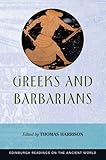Greeks And Barbarians / Thomas Harrison.
Material type: TextSeries: Edinburgh Readings on the Ancient World : ERAWPublisher: Edinburgh : Edinburgh University Press, [2022]Copyright date: ©2001Description: 1 online resource (288 p.)Content type:
TextSeries: Edinburgh Readings on the Ancient World : ERAWPublisher: Edinburgh : Edinburgh University Press, [2022]Copyright date: ©2001Description: 1 online resource (288 p.)Content type: - 9780748612703
- 9781474468916
- 938 21
- online - DeGruyter
- Issued also in print.
| Item type | Current library | Call number | URL | Status | Notes | Barcode | |
|---|---|---|---|---|---|---|---|
 eBook
eBook
|
Biblioteca "Angelicum" Pont. Univ. S.Tommaso d'Aquino Nuvola online | online - DeGruyter (Browse shelf(Opens below)) | Online access | Not for loan (Accesso limitato) | Accesso per gli utenti autorizzati / Access for authorized users | (dgr)9781474468916 |
Frontmatter -- Contents -- Acknowledgements -- Note to the Reader -- Abbreviations -- Map -- General Introduction -- PART I Sources -- Introduction to Part I -- 1 Herodotus the Tourist -- 2 Battle Narrative and Politics in Aeschylus' Persae -- 3 Greeks and Barbarians in Euripides' Tragedies: The End of Differences? -- 4 The Athenian Image of the Foreigner -- PART II Themes -- Introduction to Part II -- 5 When is a Myth Not a Myth? Bernal's 'Ancient Model' -- 6 The Greek Notion of Dialect -- 7 The Greek Attitude to Foreign Religions -- PART III Peoples -- Introduction to Part III -- 8 History and Ideology: The Greeks and 'Persian Decadence' -- 9 The Greeks as Egyptologists -- PART IV Overviews -- Introduction to Part IV -- 10 The Problem of Greek Nationality -- 11 Greeks and Others: From Antiquity to the Renaissance -- 12 The Construction of the 'Other' -- Intellectual Chronology -- Guide to Further Reading -- Bibliography -- Index
restricted access online access with authorization star
http://purl.org/coar/access_right/c_16ec
How did the Greeks view foreign peoples? This book considers what the Greeks thought of foreigners and their religions, cultures and politics, and what these beliefs and opinions reveal about the Greeks.The Greeks were occasionally intrigued by the customs and religions of the many different peoples with whom they came into contact; more often they were disdainful or dismissive, tending to regard non-Greeks as at best inferior, and at worst as candidates for conquest and enslavement. Facing up to this less attractive aspect of the classical tradition is vital, Thomas Harrison argues, to seeing both what the ancient world was really like and the full nature of its legacy in the modern. In this book he brings together outstanding European and American scholarship to show the difference and complexity of Greek representations of foreign peoples - or barbarians, as the Greeks called them - and how these representations changed over time.The book looks first at the main sources: the Histories of Herodotus, Greek tragedy, and Athenian art. Part II examines how the Greeks distinguished themselves from barbarians through myth, language and religion. Part III considers Greek representations of two different barbarian peoples - the allegedly decadent and effeminate Persians, and the Egyptians, proverbial for their religious wisdom. In part IV three chapters trace the development of the Greek-barbarian antithesis in later history: in nineteenth-century scholarship, in Byzantine and modern Greece, and in western intellectual history.Of the twelve chapters six are published in English for the first time. The editor has provided an extensive general introduction, as well as introductions to the parts. The book contains two maps, a guide to further reading and an intellectual chronology. All passages of ancient languages are translated, and difficult terms are explained.
Issued also in print.
Mode of access: Internet via World Wide Web.
In English.
Description based on online resource; title from PDF title page (publisher's Web site, viewed 02. Mrz 2022)


